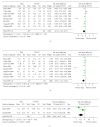Effects of yoga on psychological health, quality of life, and physical health of patients with cancer: a meta-analysis
- PMID: 21437197
- PMCID: PMC3062158
- DOI: 10.1155/2011/659876
Effects of yoga on psychological health, quality of life, and physical health of patients with cancer: a meta-analysis
Abstract
Yoga is one of the most widely used complementary and alternative medicine therapies to manage illness. This meta-analysis aimed to determine the effects of yoga on psychological health, quality of life, and physical health of patients with cancer. Studies were identified through a systematic search of seven electronic databases and were selected if they used a randomized controlled trial design to examine the effects of yoga in patients with cancer. The quality of each article was rated by two of the authors using the PEDro Scale. Ten articles were selected; their PEDro scores ranged from 4 to 7. The yoga groups compared to waitlist control groups or supportive therapy groups showed significantly greater improvements in psychological health: anxiety (P = .009), depression (P = .002), distress (P = .003), and stress (P = .006). However, due to the mixed and low to fair quality and small number of studies conducted, the findings are preliminary and limited and should be confirmed through higher-quality, randomized controlled trials.
Figures





References
-
- Cancer. September 2009, http://www.who.int/mediacentre/factsheets/fs297/en/index.html.
-
- Luebbert K, Dahme B, Hasenbring M. The effectiveness of relaxation training in reducing treatment-related symptoms and improving emotional adjustment in acute non-surgical cancer treatment: a meta-analytical review. Psycho-Oncology. 2001;10(6):490–502. - PubMed
-
- Christo PJ, Mazloomdoost D. Cancer pain and analgesia. Annals of the New York Academy of Sciences. 2008;1138:278–298. - PubMed
-
- Walker J, Sharpe M. Depression care for people with cancer: a collaborative care intervention. General Hospital Psychiatry. 2009;31(5):436–441. - PubMed
LinkOut - more resources
Full Text Sources
Medical

